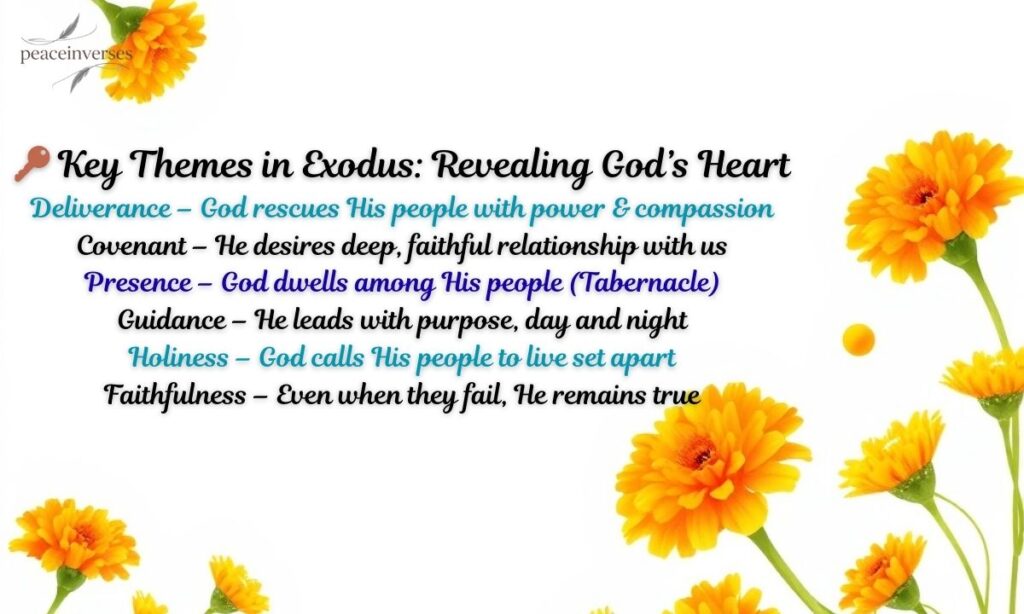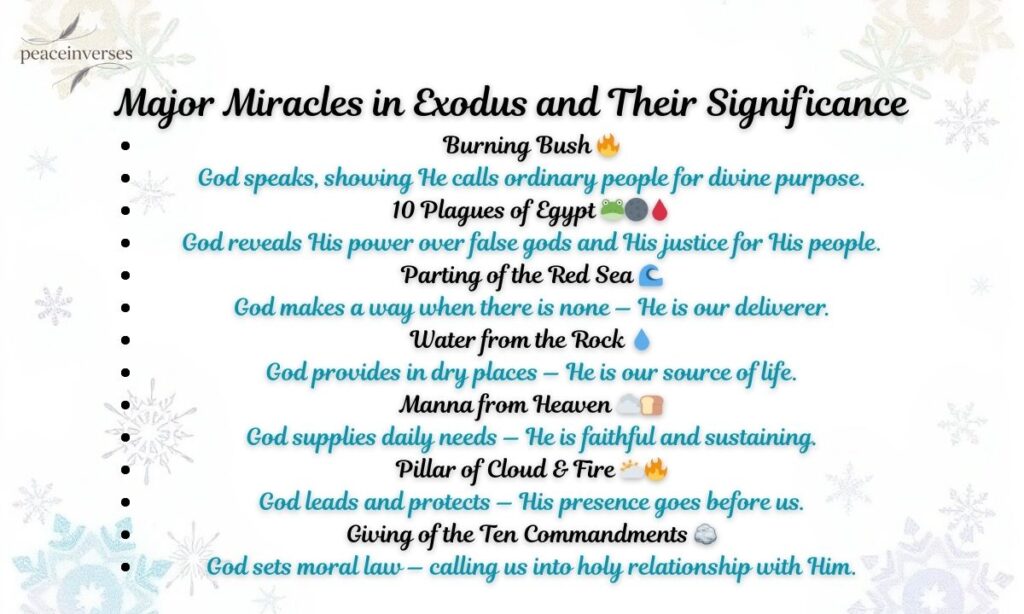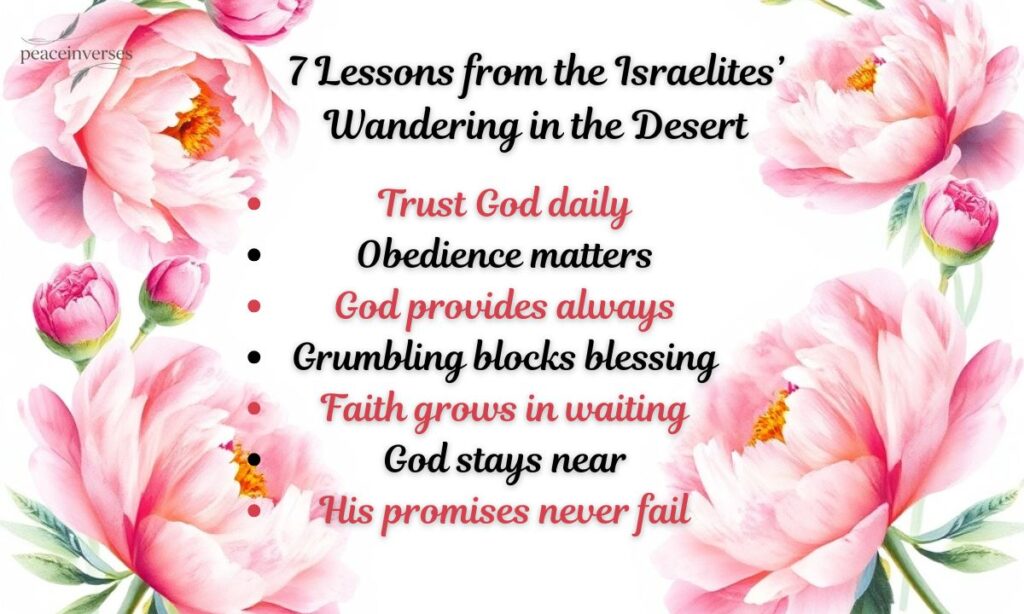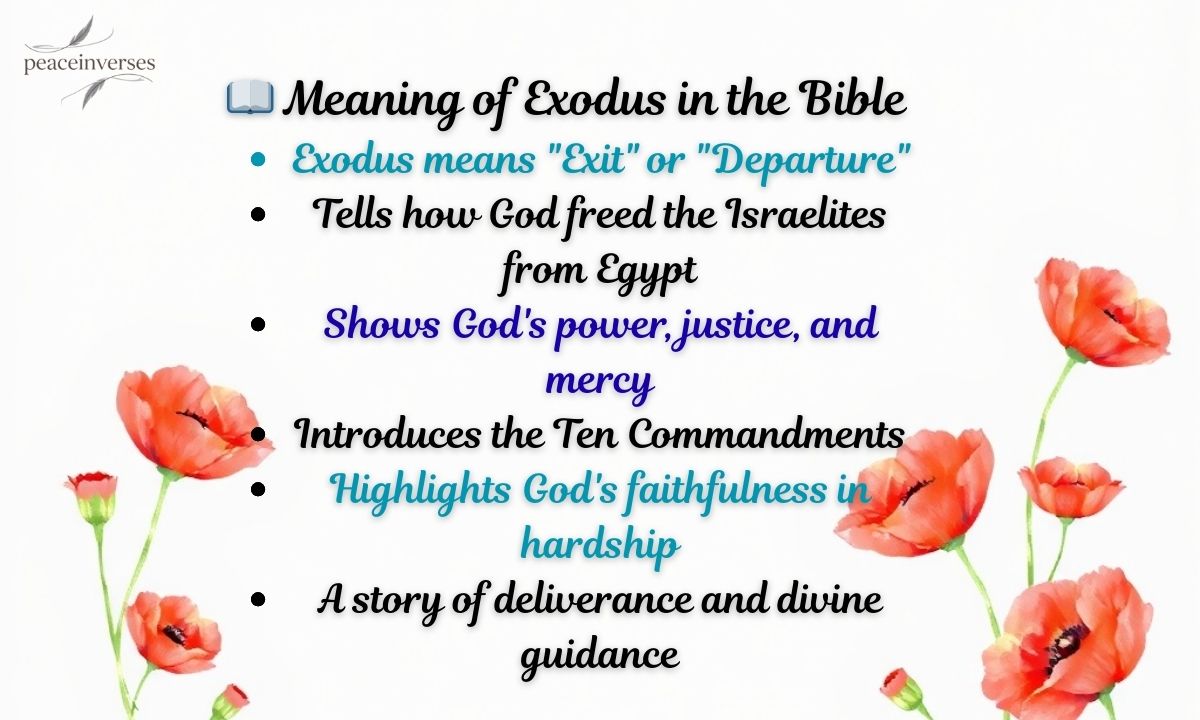Freedom is never free. The story of Exodus shows us a people crying out under bondage, waiting for God to move. It is more than history; it is a mirror of our own struggles for hope, direction, and deliverance.
The Book of Exodus tells how God led Israel from slavery to promise, shaping their identity through trials and faith. In their journey, we find timeless lessons of trust, courage, and redemption that still speak powerfully today.
What Does Exodus Mean in the Bible?
The Book of Exodus is more than a story of the past. It tells how God led His people out of slavery into freedom. The word itself carries a message of departure, deliverance, and new beginnings. It speaks of God’s power to bring His people from darkness into light.
Hebrew and Greek Origins of Exodus
The word Exodus comes from two roots. In Hebrew, the book is called Shemot, meaning “Names,” pointing to the people God remembered and redeemed. In Greek, it is called Exodos, meaning “departure” or “going out.” Together, these names show the heart of the story: God rescuing His people.
This dual meaning carries spiritual depth. It is not just about leaving Egypt; it is about leaving bondage behind. It marks the beginning of Israel’s covenant with God and the shaping of their identity as His chosen nation. The journey reflects both physical freedom and spiritual renewal.
Summary of the Book of Exodus
The Book of Exodus is a story of deliverance and covenant. God hears the cries of His people in Egypt and raises Moses to lead them out. Through mighty acts, including the ten plagues and the Passover, He shows His power over Pharaoh. The crossing of the Red Sea marks their freedom.
“The Lord will fight for you; you need only to be still” (Exodus 14:14).
Exodus is also a book of revelation and guidance. At Mount Sinai, God gives His law, including the Ten Commandments (Exodus 20:1–17). He establishes a covenant with Israel, calling them His chosen nation. The tabernacle is built, symbolizing God’s presence among His people.
“I will walk among you and be your God, and you will be my people” (Leviticus 26:12).
Key Themes in Exodus Revealing God’s Heart
The Book of Exodus reveals how God moves with power and purpose. It shows His heart for freedom, His call to covenant, and His presence with His people. Through trials and miracles, He proves Himself as Redeemer, Lawgiver, and Provider. These themes still guide faith today.

Deliverance from Bondage
God shows His mighty hand by delivering Israel from Egypt. He hears their cries and breaks Pharaoh’s grip through plagues and miracles. The Passover lamb becomes a lasting sign of redemption. Freedom is not earned but given by God’s power.
“I am the Lord your God, who brought you out of Egypt, out of the land of slavery” (Exodus 20:2).
This theme speaks beyond history. Deliverance in Exodus points to Christ, the true Passover Lamb. Just as Israel was freed from Egypt, believers are freed from sin and death. The journey reminds us that God rescues not only bodies but souls.
“For Christ, our Passover lamb, has been sacrificed” (1 Corinthians 5:7).
Covenant Relationship at Sinai
At Mount Sinai, God establishes a covenant with His people. He gives the Ten Commandments as the foundation of holy living. Israel is called to walk in obedience and reflect God’s character. This covenant reveals His desire for a people set apart.
“Now if you obey me fully and keep my covenant, then out of all nations you will be my treasured possession” (Exodus 19:5).
The covenant is more than rules; it is about relationship. God invites Israel to be His own and promises His faithfulness. Covenant means belonging, trust, and responsibility. In Christ, this covenant is made new and eternal.
“This cup is the new covenant in my blood, which is poured out for you” (Luke 22:20).
Divine Presence and Provision
God’s presence is central in Exodus. He leads His people by cloud by day and fire by night. His glory fills the tabernacle as a sign that He dwells with them. Provision flows from His hand—manna, water, and protection.
“My Presence will go with you, and I will give you rest” (Exodus 33:14).
This theme reminds us of God’s ongoing care. Even in deserts, He never abandons His people. The tabernacle points forward to Christ, God with us, and the Spirit who dwells within. God not only provides for needs but also gives Himself.
“And surely I am with you always, to the very end of the age” (Matthew 28:20).
Leadership Through Faith
Exodus highlights leadership shaped by trust in God. Moses, though hesitant, becomes a servant leader through obedience. His courage grows as he relies on God’s word and power.
Leadership in Exodus is about serving, not ruling. “Who am I that I should go to Pharaoh and bring the Israelites out of Egypt?” And God said, “I will be with you” (Exodus 3:11–12).
This theme teaches us about faith-driven leadership today. True leaders point people back to God, not themselves. They guide with humility, prayer, and dependence on His promises. The greatest leader fulfilled this in Christ.
“The Son of Man did not come to be served, but to serve” (Mark 10:45).
Major Miracles in Exodus and Their Significance
The Book of Exodus is filled with miracles that reveal God’s power and authority. The ten plagues prove His supremacy over Egypt’s gods. The parting of the Red Sea shows His protection and deliverance. Each miracle carries a lesson of faith, judgment, and redemption for His people.
These acts are more than dramatic events. They point to God’s faithfulness and His ultimate plan of salvation through Christ. From water from the rock to manna from heaven, every miracle shows God’s care. They remind us that the God of Exodus is still the God who saves and provides today.

The Ten Plagues: God’s Supremacy Over False Gods
The plagues were not random punishments but direct judgments on Egypt’s idols. From the Nile turning to blood to the death of the firstborn, each plague revealed God’s power and justice. Israel was protected while Egypt faced devastation. The message was clear: only the Lord is God.
This miracle shows that God fights for His people. The Passover became a lasting sign of His salvation. The lamb’s blood on the doorposts pointed ahead to Christ, the Lamb of God. God proves that no earthly power can stand against His will.
Exodus 12:13 – “When I see the blood, I will pass over you. No destructive plague will touch you when I strike Egypt.”
The Red Sea Crossing: Deliverance Through Power
When Israel stood trapped between Pharaoh’s army and the sea, God made a way. He parted the waters, allowing His people to cross on dry ground. This miracle revealed His deliverance and protection in impossible circumstances. What seemed like death turned into freedom.
The Red Sea crossing is a symbol of salvation. Just as Israel passed through the waters into new life, believers pass from death to life through Christ. God shows that He saves completely and powerfully when His people trust Him.
Exodus 14:21–22 – “Moses stretched out his hand over the sea, and all that night the Lord drove the sea back… The Israelites went through the sea on dry ground, with a wall of water on their right and on their left.”
Manna from Heaven: God’s Daily Provision
In the wilderness, God provided manna, bread from heaven, to sustain His people. Each morning, they gathered just enough for the day, showing their dependence on Him. The miracle taught Israel that God provides faithfully even in barren places.
This miracle points to Christ, the Bread of Life. Just as manna fed Israel physically, Jesus satisfies our deepest hunger. God’s provision is not just material but eternal. He gives life that never runs dry.
Exodus 16:15 – “When the Israelites saw it, they said to each other, ‘What is it?’ For they did not know what it was. Moses said to them, ‘It is the bread the Lord has given you to eat.’”
Water from the Rock: Life in the Desert
At Rephidim, Israel cried out for water, and God commanded Moses to strike the rock. From the rock flowed living water, meeting their desperate need. This miracle showed God’s patience, care, and willingness to provide even when His people doubted.
The rock became a picture of Christ. Paul later wrote that the rock symbolized Jesus, who gives spiritual water that never runs dry. God shows that He alone can satisfy both body and soul in the wilderness of life.
Exodus 17:6 – “I will stand there before you by the rock at Horeb. Strike the rock, and water will come out of it for the people to drink.”
Why the Covenant at Sinai Still Matters
The Covenant at Sinai is more than ancient history. It shows God’s desire for relationship, holiness, and order. Through His law, He shaped Israel into a nation with purpose. Its lessons of obedience, justice, and faith still guide believers today.

The Ten Commandments as a Guide
The Ten Commandments reveal God’s holiness and call His people to reflect it. They show how to honor Him and how to treat others with justice and love. These principles are not bound to time but remain foundations of morality. They protect relationships and guide communities.
For Christians, the commandments point us to our need for grace. While they show God’s standards, Christ fulfills the law and enables us to live by the Spirit. The commandments continue to teach us about love, respect, and responsibility in everyday life.
Exodus 20:1–2 – “And God spoke all these words: ‘I am the Lord your God, who brought you out of Egypt, out of the land of slavery.’”
Israel’s Identity as God’s People
At Sinai, God declared Israel His treasured possession and called them a kingdom of priests. This covenant gave them a unique identity and mission. It was not only about laws but about belonging to the Lord. Israel’s calling was to live as a holy nation before the world.
This identity carries into the New Testament, where believers are called a “royal priesthood.” The covenant teaches that God’s people are chosen not for privilege but for service and witness. It shows that true identity is rooted in God’s love and promises.
Exodus 19:5–6 – “Now if you obey me fully and keep my covenant, then out of all nations you will be my treasured possession. Although the whole earth is mine, you will be for me a kingdom of priests and a holy nation.”
7 Lessons from the Israelites’ Wandering in the Desert
The wilderness journey of Israel is filled with lessons of faith, struggle, and God’s care. It shows that the path to freedom is never simple but always guided by His hand. In their failures and victories, we see warnings and promises for our own lives. The desert teaches us to trust God daily.

The Path to Freedom is Rarely Easy
Israel’s journey reminds us that freedom requires perseverance. The route to the Promised Land was not direct, but God led them with wisdom and purpose. Every hardship was shaping them for a greater future. The Red Sea showed His power over the impossible.
God also gave His presence as guidance. A cloud by day and fire by night reminded them that He never left. Today, His Word and Spirit are our guides. Freedom is not instant but built through trust, step by step.
Exodus 13:17–18 – “God did not lead them on the road through the Philistine country, though that was shorter… So God led the people around by the desert road toward the Red Sea.”
Exodus 14:21–22 – “Moses stretched out his hand over the sea… The Israelites went through the sea on dry ground.”
Exodus 13:21 – “By day the Lord went ahead of them in a pillar of cloud… and by night in a pillar of fire.”
God Fights for His People
The desert reveals that victory does not depend on strength but on God’s power. When Israel faced Pharaoh’s army, they were helpless on their own. Yet God told them to stand still, and He fought for them. Trusting His protection is part of faith.
This lesson continues for us today. We face spiritual battles that we cannot win by ourselves. But God promises to defend His people. We are called to stand firm and believe that His strength is enough for every enemy.
Exodus 14:14 – “The Lord will fight for you; you need only to be still.”
God Provides Miraculously
In the desert, God showed His care through daily provision. He gave manna from heaven and water from a rock. These miracles prove that God sustains His people even when resources are gone. His care is constant, even in barren places.
The people also sinned, building the golden calf. Yet God’s mercy still redeemed them. He promised His presence and rest, reminding them of hope. His provision is not only physical but also spiritual—life, forgiveness, and peace.
Exodus 16:4 – “I will rain down bread from heaven for you. The people are to go out each day and gather enough for that day.”
Exodus 17:6 – “Strike the rock, and water will come out of it for the people to drink.”
Exodus 32:9–10 – “I have seen these people… they are a stiff-necked people. Now leave me alone so that my anger may burn against them.”
Exodus 33:14 – “My Presence will go with you, and I will give you rest.”
Spiritual Significance of Exodus for Today
The story of Exodus speaks across all generations. It shows God’s deliverance from bondage, His provision in the wilderness, and His covenant of love. Today, it calls us to trust His power in our struggles. It reminds us to live as His chosen people even in hard places.
Key Lessons We Learn from Exodus
- Deliverance: God rescues His people from slavery, just as He delivers us from sin.
- Provision: Manna and water remind us God meets daily needs in barren times.
- Covenant: Sinai teaches us we belong to Him as His treasured possession.
- Presence: God’s cloud and fire assure us He never leaves.
- Faith: Israel’s journey shows that trust in God brings strength in trials.
- Leadership: Moses reveals how God shapes leaders through obedience.
- Hope in Christ: Every miracle points forward to Jesus, the true Redeemer.
Spiritual Significance of Exodus
| Theme | Lesson for Israel | Application for Today | Key Verse |
| Deliverance | Freed from Egypt’s slavery | God delivers us from sin through Christ | Exodus 20:2 |
| Provision | Manna and water in the desert | God provides for daily needs, physical and spiritual | Exodus 16:4 |
| Covenant | Called as God’s chosen nation | Believers belong to God through Christ’s new covenant | Exodus 19:5 |
| Presence | Cloud by day, fire by night | God’s Spirit dwells with believers always | Exodus 33:14 |
| Hope in Christ | Miracles foreshadow salvation | Christ fulfills God’s ultimate plan of redemption | 1 Cor. 5:7 |
Frequently Asked Questions
What does “Exodus” mean in the Bible?
Exodus means “departure” or “going out.” It refers to Israel’s deliverance from Egypt and God’s call to freedom.
Why is the Book of Exodus important?
It shows God’s power, provision, and covenant. It teaches believers how God delivers and guides His people.
How does Exodus point to Jesus?
The Passover lamb, manna, and water from the rock all foreshadow Christ. He is the true Redeemer.
What lessons can we apply from Exodus today?
We learn to trust God in trials, obey His Word, and depend on His presence daily.
Is Exodus only about history?
No, it is both history and spiritual truth. It shows how God’s salvation in the past points to His work today.
Conclusion – Walk in Your Own Exodus
The story of Exodus is not only Israel’s journey but also ours. God calls us to leave behind fear, sin, and doubt, and to walk in freedom. His power to deliver is still real today.
Your own “Exodus” may look like trusting Him in trials or seeking His presence in daily life. Just as He led Israel, He promises to lead you. Walk forward in faith, knowing God is with you.

Muhammad Shoaib is a passionate faith-based writer with over 10 years of experience in creating meaningful content centered around prayers, Bible meanings, scriptural teachings, and heartfelt wishes. He is the lead writer at PeaceInVerses.com, where he shares spiritual insights and uplifting messages to guide and inspire readers on their faith journey.

